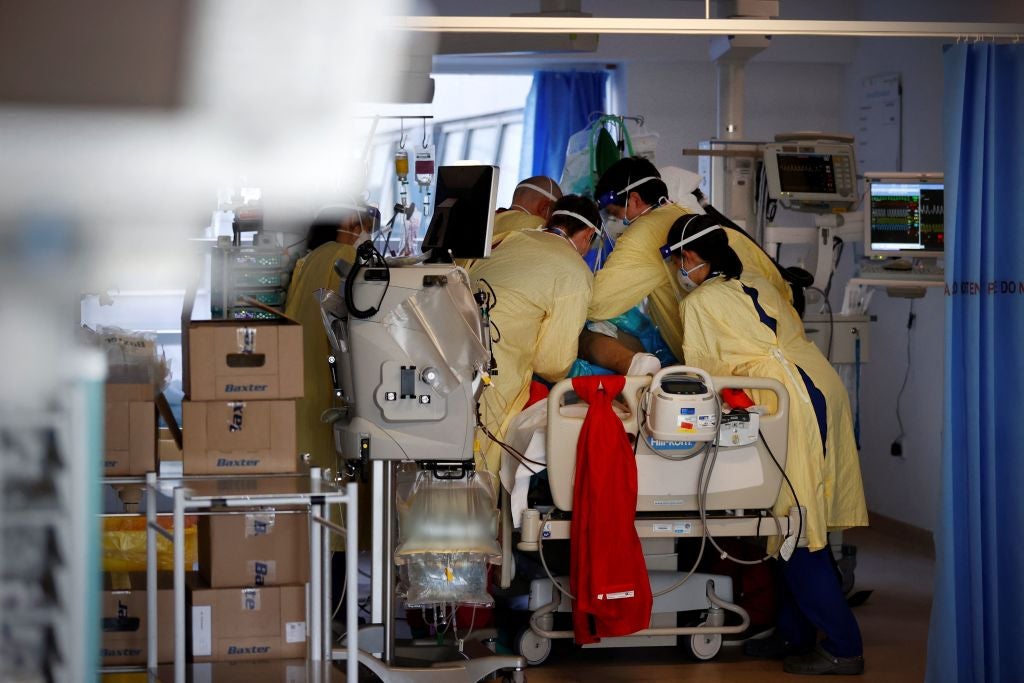NHS frontline staff should get the same mental health services as war veterans, even when the pandemic is over
Research shows staff working in critical care during the pandemic have more than twice the rate of PTSD found in military veterans who have recently experienced combat, writes Jane Dacre


In March this year, to fulfil the promises made in the Military Covenant, the NHS established dedicated veterans’ mental health services, which provide rapidly accessed, occupationally informed care for veterans who have been psychologically injured because of their service.
More than 13,000 former troops have benefited from specialist care for issues such as anxiety and depression, and almost 2,000 more have received help for more complex problems such as post-traumatic stress disorder (PTSD).
I, alongside 12 other healthcare leaders from a range of organisations, have written to the government to urge them to take inspiration from this excellent and fitting initiative when designing mental health services for NHS staff, whose work during the Covid-19 pandemic has caused or exacerbated mental health difficulties.
Despite the difference in context between the military on deployment and healthcare staff working during the pandemic, there are key similarities in terms of exposure to trauma and risk to psychological and physical health. Indeed, a study by Professor Neil Greenberg of staff working in critical care during the pandemic shows that they report more than twice the rate of PTSD found in military veterans who have recently experienced combat.
The duration and severity of the Covid-19 pandemic has had a huge impact on an already stretched workforce. While most healthcare workers will be used to dealing with illness and death, many have been handling extremely high numbers of critically ill and dying patients, made more challenging by restrictions on family visits. Others have been unable to deliver essential care for patients, which has the potential to cause moral injury – psychological distress caused by actions that violate your moral or ethical code – and mental health disorders.
In addition, support and facilities management staff have also been under significant pressure to keep healthcare services functioning.
The government has made some positive steps to address this issue in the NHS People Plan, including piloting wellbeing hubs and creating a national support service for critical care staff. However, the concern is that when the crisis is over, some of the local services may not be continued and longer-term treatment for conditions, including but not limited to PTSD, will not be prioritised.
We believe a dedicated mental health support service, similar to that established for former troops, is needed. The NHS has been at the frontline of our nation’s battle against this virus and staff have risked their health in performing their duties with great dedication. This is analogous to the way that military personnel perform, putting their health on the line when the nation requires them to do so.
Establishing a dedicated, rapid access, occupationally focused service for healthcare workers feels like the right thing to do, just as establishing specific veterans’ mental health services is morally right.
If appropriate support is not offered, sadly we may lose staff from the workforce temporarily, placing even more pressure on stretched resources, or even permanently. In a recent British Medical Association survey thousands of exhausted doctors said they are considering leaving the NHS in the next year, as many continue to battle mental wellbeing conditions without adequate respite from the demands of the pandemic.
Many are in a desperate situation, and this is not something that can wait. It is a ticking time bomb and we hope the government will act as a matter of urgency.
Professor Dame Jane Dacre is president of the Medical Protection Society



Join our commenting forum
Join thought-provoking conversations, follow other Independent readers and see their replies
Comments